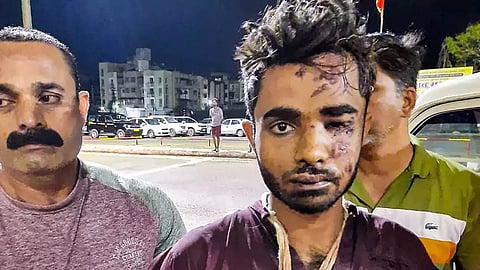

New Delhi | The National Investigation Agency (NIA) has charge-sheeted the sole accused in the Kerala train arson case that left three persons, including a child, dead and nine injured in April, an official said on Saturday.
Sharukh alias Sharukh Saifi, who lived in the Shaheen Bagh area of New Delhi and was self-radicalised by following online propaganda of radical Islamic preachers, has been charged under various sections of the Indian Penal Code, Unlawful Activities (Prevention) Act, Railways Act and Prevention of Damage to Public Property (PDPP) Act, a spokesperson of the federal agency said.
The 27-year-old is accused of committing the terror act by setting the D1 Coach of Alappuzha- Kannur Executive Express on fire on April 2.
“Sharukh, the sole accused in the gory case, had sprinkled petrol on the passengers and set the bogey on fire with a lighter with the intention to kill people,” the spokesperson said quoting the charge sheet.
The accused had boarded the moving Alappuzha- Kannur Executive Express, committed the terror act and continued to travel in the same train till Kannur, before escaping to Ratnagiri, Maharashtra, from where he was eventually arrested, the spokesperson said.
The official said Sharukh had travelled to Kerala from New Delhi on March 31 and reached the state on April 2.
“The accused purchased petrol from a petrol bunk in Shoranur and a lighter from a nearby store at Shoranur Railway Station,” the spokesperson said.
The official said the investigations show that he had chosen Kerala for the act involving terror and arson as he wanted to commit his "Jihadi" act in a location where he would not be recognised.
“He had intended to return to normal life after the commission of the act, aimed at creating terror in the minds of the general public,” the spokesperson said.
The official said the accused was self-radicalised through various online propaganda material available on social media in favour of violent extremism and Jihad, as propagated by radical Islamic preachers of Indian and foreign nationalities.
“In this process, he followed radical and hardline Islamic preachers including those who are Pakistan-based, on social media platforms. He had committed the arson as a Jihadi terror act in pursuance of the online radicalisation,” the spokesperson said.
The case was initially registered at Kozhikode Railway Police Station, Kerala, and later by the Special Investigation Team, Kerala.
On April 17, the NIA took over the investigations of the case under the direction of the Ministry of Home Affairs.
During the course of its investigations, NIA conducted searches at 10 locations in Delhi and seized digital devices. Several witnesses were questioned and CCTV footage from the Railway Station was also seized, the spokesperson said.
